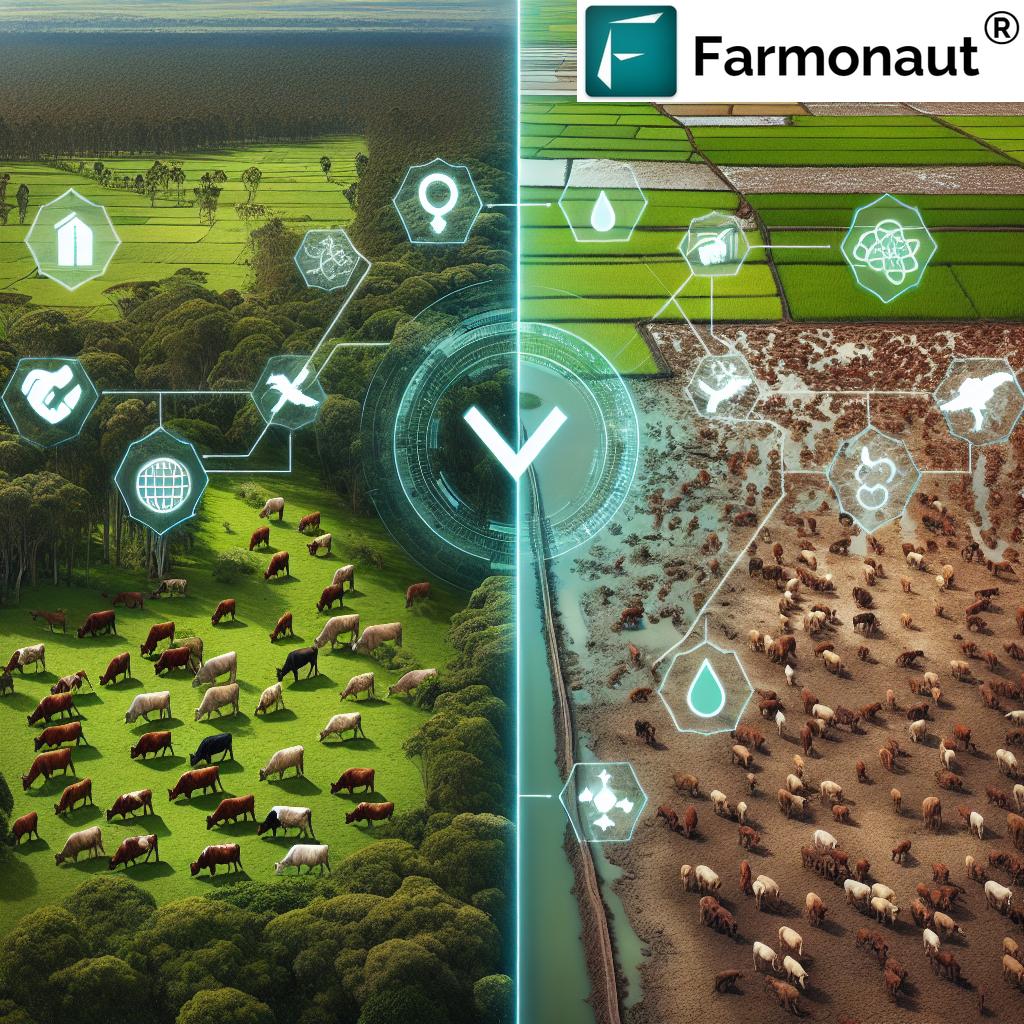Bridging the Urban-Rural Divide: Queensland’s Push for Sustainable Agricultural Education and Career Pathways
“Queensland’s farm to school initiatives have introduced over 100,000 students to agricultural practices in the past decade.”
In the heart of Australia’s Sunshine State, a critical conversation is unfolding about the future of our food, our farms, and our children’s education. We at Farmonaut recognize the urgent need to address the growing disconnect between urban and rural communities, particularly when it comes to understanding the vital role of agriculture in our society. As we delve into this pressing issue, we’ll explore how Queensland is at the forefront of a movement to revitalize agricultural education and create sustainable career pathways for the next generation.
The Crisis in Agricultural Education Funding
Agricultural education programs across Queensland and indeed, throughout Australia, are facing a dire funding crisis. This shortfall threatens the very existence of farm to school initiatives and the promotion of sustainable farming practices. The consequences of this crisis extend far beyond the classroom, potentially impacting our future food security and environmental stewardship.
- Reduced exposure to farming practices for urban students
- Declining agricultural literacy among the general population
- Fewer opportunities for hands-on learning in rural schools
- Diminished awareness of agtech career opportunities
As advocates for precision agriculture and sustainable farming practices, we at Farmonaut understand the critical importance of these educational programs. They serve as the foundation for cultivating a new generation of farmers, agronomists, and agricultural innovators who will shape the future of food production.

The Urban-Rural Education Gap: A Growing Concern
The widening chasm between urban and rural education is a pressing issue that demands our immediate attention. In Queensland, as in many parts of Australia, there’s a noticeable disparity in the agricultural knowledge and exposure between city-dwelling students and their rural counterparts. This gap not only affects individual career prospects but also impacts our collective understanding of food production and environmental sustainability.
To bridge this divide, we need to focus on:
- Integrating agricultural concepts into urban school curricula
- Facilitating farm visits and rural immersion programs for city students
- Leveraging technology to bring the farm experience into urban classrooms
- Promoting cross-cultural exchanges between urban and rural schools
At Farmonaut, we believe that technology can play a crucial role in bridging this educational gap. Our satellite-based crop monitoring solutions, for instance, can be used as educational tools to demonstrate modern farming techniques to students, regardless of their location.
The Importance of Agricultural Literacy for Students
Agricultural literacy is not just about knowing where food comes from; it’s about understanding the complex systems that sustain our society and environment. By introducing agricultural education programs in schools, we can foster a deeper appreciation for:
- The science behind food production
- The economics of farming and global food markets
- The environmental impact of different agricultural practices
- The role of technology in modern agriculture
These programs serve as a foundation for creating informed consumers, policymakers, and potentially future farmers or agribusiness professionals. In Queensland, initiatives like the School to Industry Partnership Program have been instrumental in bringing agricultural knowledge to the forefront of education.
Farm to School Initiatives: Connecting Classrooms to Agriculture
Farm to school initiatives are more than just educational programs; they’re a bridge between our urban centers and the rural heartlands that feed them. These initiatives offer numerous benefits:
- Hands-on learning experiences for students
- Direct connections between farmers and young consumers
- Promotion of healthy eating habits and nutrition education
- Support for local agricultural economies
In Queensland, programs like “Farmers 2 Founders” have been successful in bringing the farm experience to schoolchildren in Brisbane and other urban areas. These initiatives not only educate but also inspire young minds to consider careers in agriculture and related fields.
“Agricultural education programs have increased student interest in agtech careers by 40% in participating schools.”
Sustainable Farming Practices: Educating for the Future
As we face the challenges of climate change and resource scarcity, educating students about sustainable farming practices becomes increasingly crucial. Agricultural education programs in Queensland are focusing on:
- Water conservation techniques
- Soil health management
- Integrated pest management
- Renewable energy in agriculture
By incorporating these concepts into the curriculum, we’re preparing the next generation to tackle the environmental challenges that lie ahead. At Farmonaut, we support this educational mission by providing tools that enable precision agriculture and resource optimization, which are key components of sustainable farming.

Agtech Career Opportunities: Paving the Way for Innovation
The agricultural sector is evolving rapidly, with technology playing an increasingly significant role. By exposing students to agtech career opportunities, we’re opening doors to a world of possibilities:
- Precision agriculture specialists
- Drone operators for crop monitoring
- Data analysts for farm management
- Agricultural software developers
These high-tech roles represent the future of farming, and it’s crucial that we prepare our youth to fill these positions. Farmonaut’s platform serves as an excellent example of how technology is transforming agriculture, offering students a glimpse into the potential careers that await them in this field.
Explore Farmonaut’s advanced agricultural solutions:
The Role of Government in Supporting Agricultural Education
The Queensland government plays a pivotal role in shaping the future of agricultural education. However, current funding challenges threaten to undermine progress made in recent years. We call upon policymakers to:
- Increase funding for agricultural education programs
- Develop comprehensive agricultural curricula for all education levels
- Support teacher training in agricultural sciences
- Facilitate partnerships between schools and local farms
By investing in these areas, the government can ensure that Queensland remains at the forefront of agricultural innovation and education. It’s not just an investment in education; it’s an investment in our state’s future food security and economic prosperity.
Connecting Young Minds with Farmers: Building Bridges
One of the most effective ways to inspire the next generation of agricultural professionals is by facilitating direct connections between students and farmers. These interactions provide:
- Real-world context to classroom learning
- Mentorship opportunities for aspiring farmers
- A deeper understanding of the challenges and rewards of farming
- Exposure to diverse agricultural enterprises
Programs that bring farmers into classrooms or take students to farms are invaluable. They humanize the agricultural industry and help students see the diverse career paths available within it. At Farmonaut, we support these initiatives by offering our technology as a tool for farmers to showcase modern agricultural practices to students.
Environmental Stewardship Through Agricultural Education
As we face growing environmental challenges, instilling a sense of environmental stewardship in our youth is crucial. Agricultural education programs in Queensland are increasingly focusing on:
- Biodiversity conservation in farming landscapes
- Sustainable land management practices
- Climate-smart agriculture techniques
- The role of agriculture in carbon sequestration
By educating students about these aspects, we’re not only preparing them for careers in agriculture but also fostering a generation of environmentally conscious citizens. Farmonaut’s satellite-based monitoring systems can be used as educational tools to demonstrate how technology can aid in environmental conservation efforts within agriculture.
Discover how Farmonaut’s API can enhance agricultural research and education: Farmonaut API
Diverse Pathways in the Agricultural Sector
The agricultural industry offers a wide array of career opportunities that extend far beyond traditional farming. By exposing students to this diversity, we can attract a broader range of talents to the sector. Some of these pathways include:
- Agricultural scientists and researchers
- Food technologists and nutritionists
- Agribusiness managers and marketers
- Agricultural policy advisors
- Sustainable energy specialists in agriculture
It’s essential that our educational programs reflect this diversity, showcasing the multifaceted nature of modern agriculture. At Farmonaut, we’re committed to supporting educational initiatives that highlight these varied career paths, particularly those at the intersection of agriculture and technology.
The Debate on Rural Education Funding
The ongoing debate surrounding rural education funding in Queensland is complex and multifaceted. Key points of contention include:
- Equitable distribution of resources between urban and rural schools
- The higher cost per student in rural areas due to lower population density
- The need for specialized agricultural programs in rural schools
- Attracting and retaining qualified teachers in rural areas
As advocates for agricultural education, we believe that adequate funding for rural schools is crucial not only for the students in these areas but for the future of our agricultural industry as a whole. It’s imperative that policymakers recognize the unique needs of rural education and allocate resources accordingly.
Impact on Future Food Security
The connection between agricultural education and future food security cannot be overstated. By nurturing a new generation of agricultural professionals, we’re ensuring:
- Continued innovation in food production techniques
- Resilience in the face of climate change and other challenges
- Sustainable management of our agricultural resources
- A skilled workforce to support our food supply chain
Investing in agricultural education today is an investment in the food security of tomorrow. At Farmonaut, we’re committed to supporting this mission by providing cutting-edge tools that can be used in educational settings to demonstrate the future of agriculture.
Learn more about integrating Farmonaut’s technology into educational programs: API Developer Docs
The Urgency of Action: Preserving Agricultural Knowledge
The time to act is now. With each passing year that agricultural education programs remain underfunded, we risk losing valuable knowledge and opportunities. We must:
- Advocate for increased funding at local and state levels
- Develop partnerships between schools and agricultural businesses
- Encourage community involvement in agricultural education initiatives
- Utilize technology to enhance and expand educational opportunities
By taking these steps, we can ensure that the rich agricultural heritage of Queensland is preserved and passed on to future generations. At Farmonaut, we stand ready to support these efforts with our technology and expertise.
Agricultural Education Impact Matrix
| Impact Area | With Agricultural Education | Without Agricultural Education |
|---|---|---|
| Student Career Opportunities | Increased awareness of agtech careers by 60% | Limited understanding of agricultural career paths |
| Environmental Awareness | High comprehension of sustainable farming practices | Minimal knowledge of agriculture’s environmental impact |
| Food Production Knowledge | In-depth understanding of food systems and production | Superficial knowledge of food origins |
| Urban-Rural Connection | Strong bridge between urban and rural communities | Widening disconnect between city and country |
| Future Food Security | Robust pipeline of skilled agricultural professionals | Potential shortage of qualified workers in agriculture |
Conclusion: A Call to Action for Queensland’s Future
As we’ve explored throughout this post, the need for robust agricultural education programs in Queensland is more pressing than ever. The challenges we face – from climate change to food security – require a workforce that is knowledgeable, innovative, and passionate about agriculture. By investing in agricultural education today, we’re securing a sustainable and prosperous future for Queensland and beyond.
We call upon government officials, educators, farmers, and community members to unite in support of agricultural education. Let’s work together to bridge the urban-rural divide, create exciting career pathways in agriculture, and ensure that our children inherit a world where sustainable farming practices are the norm, not the exception.
At Farmonaut, we’re committed to playing our part in this educational journey. Our advanced satellite-based farm management solutions are not just tools for today’s farmers; they’re educational resources that can inspire and prepare the agricultural leaders of tomorrow. Together, we can cultivate a future where agriculture is understood, valued, and thriving across Queensland and Australia.
FAQ Section
Q: Why is agricultural education important for urban students?
A: Agricultural education is crucial for urban students as it bridges the knowledge gap between city and rural life, promotes understanding of food systems, and opens up diverse career opportunities in the agricultural sector.
Q: How can technology enhance agricultural education programs?
A: Technology, such as Farmonaut’s satellite-based solutions, can provide real-time data and visual aids, allowing students to understand modern farming practices, precision agriculture, and environmental monitoring without leaving the classroom.
Q: What are some career opportunities in agriculture that students might not be aware of?
A: Many students are unaware of careers in agtech, such as drone operators for crop monitoring, data analysts for farm management, agricultural software developers, and precision agriculture specialists.
Q: How does agricultural education contribute to environmental sustainability?
A: Agricultural education teaches students about sustainable farming practices, conservation techniques, and the environmental impact of food production, fostering a generation of environmentally conscious citizens and future farmers.
Q: What can parents do to support agricultural education initiatives?
A: Parents can advocate for agricultural programs in schools, support farm-to-school initiatives, encourage their children to participate in agricultural clubs or activities, and visit local farms or farmers’ markets as a family.
















